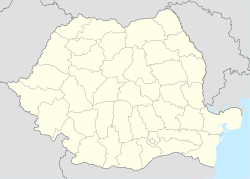Deva, Romania
| Deva | ||
|---|---|---|
| Municipality | ||
 |
||
|
||
| Location in Romania | ||
| Coordinates: 45°52′41″N 22°54′52″E / 45.87806°N 22.91444°ECoordinates: 45°52′41″N 22°54′52″E / 45.87806°N 22.91444°E | ||
| Country | Romania | |
| County | Hunedoara County | |
| Country status | Municipiu | |
| County status | County seat | |
| First mention | 1269 | |
| Component localities | Archia Bârcea Mică Cristur Sântuhalm |
|
| Government | ||
| • Mayor | Mircia Muntean (PSRO) | |
| Area | ||
| • Total | 60.03 km2 (23.18 sq mi) | |
| Elevation | 187 m (614 ft) | |
| Population (2011) | ||
| • Total | 61,123 | |
| • Density | 1,000/km2 (2,600/sq mi) | |
| Time zone | EET (UTC+2) | |
| • Summer (DST) | EEST (UTC+3) | |
| Postal code | 330005–330260 | |
| Phone area code | +40 a54 | |
| Website | www.primariadeva.ro | |
Deva (Romanian pronunciation: [ˈdeva]; Hungarian: Déva, Hungarian pronunciation: [ˈdeːvɒ]; German: Diemrich, Schlossberg, Denburg; Latin: Sargetia; Turkish: Deve, Devevar) is a city in Romania, in the historical region of Transylvania, on the left bank of the Mureș River. It is the capital of Hunedoara County.
Its name was first recorded in 1269 as castrum Dewa. The origin of the name gave rise to controversy. Some thought that the name is of old Turkic origin from the name Gyeücsa. Others assert that the name is probably of Slavic origin where Deva or Devín means "girl" or "maiden". A similar case exist in Slovak for the Devín Castle, located at the confluence of the Danube and Great Morava, on former town of Devín (now a suburb of Bratislava). It is also considered that the name comes from the ancient Dacian word dava, meaning "fortress" (as in Pelendava, Piroboridava, or Zargidava). Other theories trace the name to a Roman Legion, the Legio II Augusta, transferred to Deva from Castrum Deva, now Chester (Deva Victrix) in Britain.
...
Wikipedia


